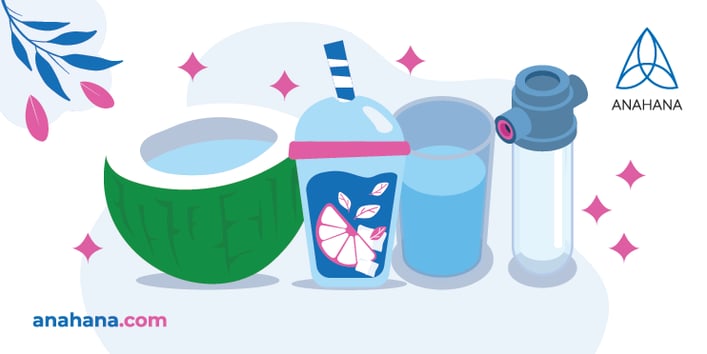
Table of Contents
Explore the essential roles of electrolytes in this comprehensive guide. Learn about their impact on nerve and muscle function, regulation of body fluids, and the importance of maintaining normal electrolyte levels. Discover the consequences of losing electrolytes and how to ensure optimal body function.
Electrolytes Explained
In the quest for optimal health and wellness, electrolytes have emerged as key players. These electrically charged minerals, vital for various bodily functions, are more than just buzzwords in sports drinks commercials; they're crucial components of our body's complex system.
Whether you're a fitness enthusiast, a health-conscious individual, or simply someone eager to understand the science behind hydration and health, this article will equip you with essential knowledge and practical insights along with the importance of healthy habits.
What Are Electrolytes?
Electrolytes are minerals found in your blood, urine, and other bodily fluids that carry an electric charge.
They are essential for many critical bodily functions. The major electrolytes in your body include sodium, potassium, chloride, calcium, magnesium, phosphate, and bicarbonate. These charged minerals play several key roles:
-
Regulating Balance of Body Fluids: Electrolytes help maintain the balance of fluids inside and outside your cells. This balance is crucial for hydration, nerve impulses, muscle function, and acid-base balance.
-
Supporting Nerve Function: Electrolytes are vital for transmitting electrical signals throughout your body. These signals are necessary for muscle contractions, including those of your heart, and for sending nerve impulses.
-
Nerve and Muscle Function: Electrolytes are fundamental for nerve and muscle function. They facilitate the transmission of electrical signals in nerve cells and muscles.
-
Balancing pH Levels: The body must maintain a slightly alkaline pH level. Electrolytes like bicarbonate play a significant role in maintaining this balance.
-
Regulating Blood Pressure: Electrolytes, especially sodium and potassium, help control your blood pressure by balancing the amount of fluid in your body.
The Different Types of Electrolytes

Here are the seven types of electrolytes found in your body:
-
Sodium
-
Chloride
-
Calcium
-
Magnesium
-
Phosphate
-
Bicarbonate
-
Potassium
All of these common electrolytes are vital for the human body. They play a key role in many of the body's functions. This answers the question of what electrolytes are but not their individual function so let's break it down further.
Sodium
Sodium is a mineral whose primary function is to ensure enough water is stored both in- and outside the cells.
On top of that it also ensures proper electrolyte balance throughout the body. This is when you have normal sodium levels in every cell membrane your body. As if that wasn't enough, sodium also helps with the muscle and nerve function in the body.
The majority of the body's sodium can be found in the blood and lymph fluid. Normal sodium levels in a healthy person should be between 135 and 145 milliequivalents per liter.
Low sodium levels go under the medical term Hypernatremia. Hypernatremia symptoms can manifest in many different ways. If you experience any of the symptoms below, after a workout or physical activity, it could be a sign of low sodium level:
-
Nausea
-
Disorientation
-
Feeling fatigued
-
Restlessness and irritability
-
Muscle weakness, spasms, or cramps
-
Seizures
-
Coma
To combat this electrolyte imbalance you need to replenish them. Restoring the lack of sodium in your body.
Many would often turn to sports drinks such as Gatorade to restore the electrolyte imbalance.
However, a simple drink such as coconut water will have the same effect. This simple, yet effective drink, includes sodium, calcium, magnesium, and potassium.
Another “homemade” electrolyte drink is milk. It is rich in calcium, sodium, and potassium.
Chloride
Here we have one of the most important electrolytes in the body. Just as sodium, chloride ensures that the body retains the proper amount of water both within and outside the cells.
Besides this, it is also crucial when it comes to a human's blood pressure, volume, and pH levels. Suffering from low chloride levels goes under the medical term hypochloremia. In most cases, you will not even be aware that you are suffering from hypochloremia.
Instead, you might suffer from a different electrolyte imbalance and this in combination with those symptoms can cause hypochloremia. These symptoms include:
-
Fluid loss
-
Dehydration
-
Weakness or fatigue
-
Diarrhea or vomiting, caused by fluid loss
Treating hypochloremia in a medical facility is done through IV-fluids. At home, the easiest way to treat it is to consume regular table salt, drink salt water or regular water, and eat salted crackers. Any type of food rich in salt in combination with good hydration will reduce the symptoms and restore the body to normal chloride levels.
The opposite of hypochloremia is hyperchloremia. That is when you are suffering from high chloride levels. The normal chloride range is considered to be between 96 to 106 milliequivalents per liter.
Calcium
Next on the list, we have calcium which main objective is to ensure strong bones and teeth.
It is also needed for muscle movements and for nerves to send messages throughout the body. Suffering from a calcium deficiency goes under the medical term Hypocalcemia.
If the levels are just slightly low you might not notice that you are suffering from low calcium levels. As the levels keep decreasing you could start to experience symptoms such as:
-
Muscle cramps
-
Confusion
-
Brittle bones that fracture easy
-
Numbness in extremities
-
Depression or anxiety
Low calcium levels could be caused by vitamin D deficiency, low calcium intake, a medication that prevents the body to absorb calcium, amongst others.
Magnesium
Magnesium is an essential part of the body just as all the others mentioned above. Magnesium's primary functions in the body including regulating muscle and nerve functions, managing blood pressure, and keeping blood sugar levels under control.
Phosphate
85% of the body's phosphate is located in the bones of the body. The remaining 15% can be found in the cells, involved with energy production.
Suffering from low phosphate levels has the medical term Hypophosphatemia. Most people with a mild case of hypophosphatemia will show no symptoms at all. However, a more severe case can include symptoms such as:
-
Muscle weakness
-
Feeling of fatigue
-
A feeling of pain in the bones
-
Loss of appetite
-
Feeling of irritability
-
Feeling of numbness in parts of the body
-
Feeling confused
The opposite of hypophosphatemia, meaning having too high levels of phosphates in the body is called hyperphosphatemia.
It is essential for the body to maintain proper levels of phosphates in the body as it helps maintain strong bones and teeth. Too high levels can cause symptoms such as:
-
Weakness in muscle
-
Muscle cramps or spasms
-
Pain in the bones along with weak bones
-
Skin conditions such as rash or itchy skin.
Bicarbonate
Bicarbonate is another of the substances classed as an electrolyte. It is a negatively charged ion.
One of the primary functions is to regulate the body's acid-base (pH) balance. Along with this, it also works with the other electrolytes sodium, potassium, and chloride, ensuring electrical neutrality on a cellular level.
Experiencing low levels of bicarbonate is referred to as metabolic acidosis. Symptoms of this can include:
-
Breathing issues such as rapid or shallow breaths
-
Feeling confused
-
A pounding headache
-
Having issues with insomnia
-
Constantly feeling fatigued
-
Loss of appetite.
-
Skin and eyes turning yellow, called jaundice
-
Your heart rate increases
Potassium
Potassium is the opposite of bicarbonate, meaning it's a positively charged ion in the body. One of its primary functions is to conduct electricity throughout the body and is especially important for the heart. It is also worth mentioning that maintaining a potassium-rich diet will provide a lot of health benefits. These include:
-
Lower blood pressure
-
Improve water retention
-
Protect against stroke
-
Reduce the likelihood of suffering from kidney stones
As with everything, it is important to maintain proper levels of potassium in the body. Too high or too low can have severe consequences.
Too high levels are referred to as hyperkalemia is a very serious condition and requires medical attention as it can have devastating effects on the heart.
Too low levels of potassium are referred to as hypokalemia. Symptoms of this vary depending on the levels of hypokalemia as most mild cases show no to very few symptoms. The lower the levels get the worse the symptoms manifest, including:
-
Feeling fatigued and weak
-
Constipation
-
Muscle tissue starting to break down
-
Paralysis
-
Tachycardia, meaning heart beating too fast
-
Bradycardia, meaning heart beating too slow
As you can see, maintaining proper electrolyte levels is essential. This can be done through many different methods as mentioned above such as coconut water, sports drinks, milk, electrolyte powder mixed with water.
There are other electrolyte drinks you can drink that will help you maintain and restore proper electrolyte levels.
To see which electrolyte drink is best for you, do a search for the best electrolyte drinks and compare them, to find one that's best suited for you, your needs, and exercise.
The same goes for finding the best electrolyte powder as there are tons of different brands out there. Simply search for the best electrolyte powder, compare them, read reviews from others before selecting one that suits you.
Signs That You're Losing Electrolytes

Electrolyte deficiencies impact the body in various ways, primarily affecting muscle and nerve functions. Common symptoms include:
-
Muscle weakness, spasms, and cramps, indicating disruptions in muscle function.
-
Nerve-related issues like muscle twitching, irregular nerve impulses, and confusion.
-
Fluid balance disturbances, leading to dehydration or overhydration.
These symptoms highlight the importance of maintaining electrolyte balance for optimal body functions. Regular blood tests can help monitor electrolyte levels and prevent imbalances.
You can lose electrolytes through sweat, urine, and when you're ill, especially if you're experiencing vomiting or diarrhea.
Losing electrolytes can disrupt the balance in your body, leading to dehydration, a drop in blood pressure, muscle cramps, and other health issues.
Replenishing lost electrolytes, often through dietary means or supplements, is crucial, especially after intense physical activity or illness.
Causes of Electrolyte Deficiency
Electrolyte imbalances stem from multiple sources. Key contributors include:
-
Dehydration due to insufficient fluid intake or excessive loss through sweat, especially during intense exercise.
-
Medical conditions like kidney disease affecting electrolyte concentrations.
-
Dietary factors, such as inadequate intake of essential electrolytes or excessive consumption of sodium chloride.
It's crucial to maintain normal electrolyte levels for the body to function properly. These levels are finely regulated by the body to ensure that the electrical signals in nerve and muscle cells operate efficiently.
References
Electrolytes - Abstract - Europe PMC
BACK TO BASICS : Fluids and Electrolytes—Clinical Aspects
What are Electrolytes? | Cedars-Sinai
https://en.wikipedia.org/wiki/Electrolyte
https://www.ncbi.nlm.nih.gov/books/NBK541123/
https://www.medicinenet.com/electrolytes/article.htm
Disclaimer
The contents of this article are provided for informational purposes only and are not intended to substitute for professional medical advice, diagnosis, or treatment. It is always recommended to consult with a qualified healthcare provider before making any health-related changes or if you have any questions or concerns about your health. Anahana is not liable for any errors, omissions, or consequences that may occur from using the information provided.

By: Clint Johnson
Clint is the driving force and founder of Anahana. Clint teaches Yoga, Pilates, mindful breathing, and meditation, catering to a global community of students and teachers.